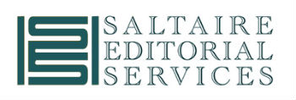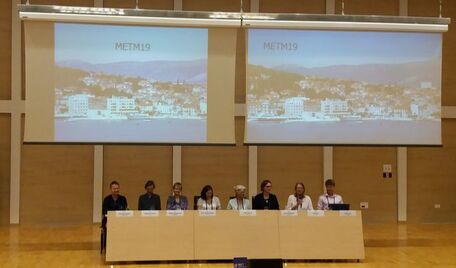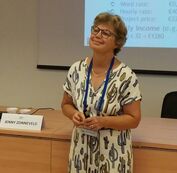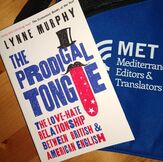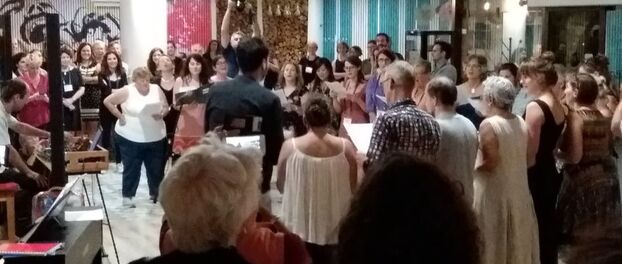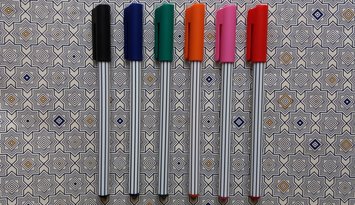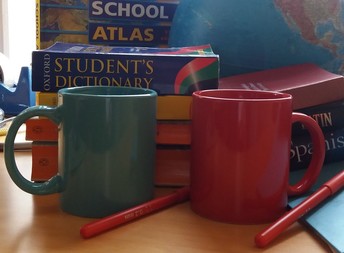|
Freelance editors and proofreaders: have you ever felt as though you’re ‘muddling through’ in your professional life? You’re not alone. The current situation has forced many of us to adjust our plans on a daily (hourly?) basis. But even without a pandemic, freelancers have to adapt to changing circumstances and come up with new plans and different ways of working. I’ve called this ‘muddling through’, but you could also call it flexibility, resourcefulness and ingenuity. Here are seven areas where this flexibility and resourcefulness will come in handy. It’s not intended to be a list of things to worry about! Instead, it’s a recognition of the creativity and pragmatism that many successful freelancers display. 1. Your initial business ideaMost of us start out with some idea of the work we’d like to do, or for which we’d be most suited. With my NHS background, I thought I’d be the ideal person to work on health- or HR-related material. However, my first publisher client specialised in non-fiction books for the general reader, so that was that – at least initially. You might have to review your initial business idea in the light of various factors:
If you’re determined to stick to your original vision, that’s fine. But it’s worth keeping an open mind about the direction you’re going to take. 2. Finding work and clientsAsk a group of freelance editors or proofreaders how they find work and you’ll end up with a list as long as your arm. Some take the direct approach, contacting potential clients with speculative enquiries. Others rely on word of mouth from professional or personal contacts, or repeat business from returning clients. Most find they need to be visible, whether that’s on their own website, through a directory or bidding site, or on social media. Networking can be successful for some. And then there’s the element of luck – the chance encounter with a potential client in an unexpected place (on a train, in the school playground, at a Zoom book club), or simply the ‘you happen to be just what we’re looking for at this moment in time’ scenario. It’s important to plan for finding work and clients so you can focus your efforts to best effect. But it also pays to be alert, flexible and ready to respond to new opportunities. To quote Louis Pasteur: ‘Chance favours the prepared mind.’ 3. Technical issuesOver and above the required editing and proofreading skills, it’s vital that you have a general level of technical proficiency. You never know when you’ll need to adapt. Yes, you might be a whizz with Microsoft Word and all its features and add-ins. But what if a client suddenly wants you to proofread a pdf or a PowerPoint presentation? What if you’re asked to work in Google Docs? It’s not about being an expert in everything. But it’s useful to be able to use a variety of tools when working on different projects. For example, you might copy text from a pdf into Word so you can use PerfectIt or your favourite macros. Copying a table of figures from Word to Excel can be a quick and accurate way of checking an author’s calculations (if that’s part of your brief). Then there’s ‘Maggying’ a corrupted Word document – copying everything except the final paragraph marker into a new document. And would you know where on your computer to look if you couldn’t find the document you’d been working on? It’s impossible to anticipate all possible scenarios and plan for them. But you do need to be able to think laterally if something unexpected happens – and to know when (and where) to seek help from others if you can’t solve the issue yourself. 4. Working hours Are you a morning person? Or do you do your best work while burning the midnight oil? It’s great to be able to choose your working times – and to decide how long you’re going to spend at work – but sometimes you might need to adjust things. How do you cope if you need to put in extra hours? Can your working space accommodate changes (for example, if you share the facilities with other family members)? How do you cope physically with doing a ten-hour day instead of your usual five hours? Again, flexibility is the key. You need to take breaks more frequently if you’re working longer hours. Are there some tasks that don’t require quite the same level of focus as others? If so, could you work on those when your concentration is waning (in the evening, perhaps)? Can you work somewhere else if need be? 5. EquipmentMost of us would admit that we take technology and equipment for granted. We carry on with our work routines assuming that everything will run as it should. But if disaster strikes, emergency action might be required. Saving your work in the cloud is sensible because it means you can access it from another device (if you have something suitable). If your internet connection goes down, you might have to use your mobile data as a short-term solution. Pre-pandemic, you might have chosen to de-camp to your local coffee shop and use their wi-fi, and we’re all hoping that’ll be possible again before too long. Home-based freelancers might even have kind neighbours who can help (a spare laptop cable here, some emergency printing there). While it’s useful to have a back-up plan (an old laptop you could bring back into service if your main computer fails, for example), it’s impossible to prepare for every eventuality. Again, it’s a question of thinking creatively, recognising when and where to ask for help, and knowing at what point to discuss the situation with your client if you’re not going to meet the deadline. 6. Personal or domestic emergenciesA sudden illness, a chronic medical condition, a relative needing help, unexpected childcare demands, not to mention burst water pipes and power cuts … these problems aren’t exclusive to freelancers (nor do they only happen during a pandemic). But if you’re working to a deadline, with no one else who can step in to do your work, situations like these can make things very difficult. Of course, some people choose freelancing precisely because it enables them to work around their personal circumstances, whether that’s their own health condition or their caring responsibilities for children, elderly relatives – or even pets. It’s when the unexpected happens that additional problems can arise. Once again, some extra flexibility is the key. Could you take a break from work and make the time up once the situation is resolved? Perhaps you can temporarily rearrange your working hours? Is there anyone who can help with childcare, even if it’s on a video call with your child while you work for a while? Freelancers often worry about telling their clients about emergencies like this, feeling that it might make them seem unprofessional. I’ve found that clients are usually very understanding about such situations, especially if you can suggest a solution (an alternative deadline, for example). And most clients would rather know you’re struggling, even if you end up not needing extra time to finish the work. After all, they’re human too! 7. Losing a major clientIt’s great when you’ve managed to secure plenty of regular, enjoyable work from a client who pays well and is nice to deal with. It’s not so great if that client suddenly disappears for some reason (bankruptcy, merger or takeover, taking the work in-house, etc.) and you’re left with a gaping hole in your work schedule. This is something that’s happened to me on a couple of occasions, and it can certainly feel like the rug has been pulled out from under your feet. Clearly, you need to respond, but how you respond will depend on your circumstances. Here are a few ideas:
So there we have it – a quick look at how a flexible, responsive approach will help in running your business. Yes, freelancing might sometimes feel like ‘muddling through’, but perhaps we should instead see it as being creative and developing resilience. That sounds much more impressive! Further readingDon't panic! How to stay calm in a crisis - CIEP blog – by Melanie Thomson
Seven things freelancers know about time – by Liz Jones How freelance editing prepared me for working through the pandemic – and how it didn’t – by Liz Jones 2020: Lessons from the Longest Year – by Crystal Shelley Buck the trend: strengthening your business during lockdown – by Rachel Gristwood How to be lucky – by Christian Busch
0 Comments
Three years ago I was inspired to write my very first blog post after a trip to Tarragona in Spain. I’d attended the annual gathering of the Mediterranean Editors and Translators (MET) – the so-called MET Meeting (METM, pronounced ‘met-um’) – and this made me think about how international my work had become since I started freelancing. This year, I decided it was time for a return visit. METM19 was in Split, Croatia, and I decided to combine the event with my annual holiday. I spent a lovely few days acclimatising myself to Split and enjoying the wonderful weather. It’s a fascinating place with a beautiful seafront and plenty of historical interest (especially Diocletian’s Palace, which was built for the Roman emperor Diocletian in the fourth century AD and is now a maze of narrow streets full of homes, shops and restaurants). When it came to METM itself, my first activity was one of the ‘Off-METM’ lunches. These are small groups focused loosely on a theme (ours was ‘Feedback is a two-way street’), aimed at helping delegates to get to know one another before the conference itself. There were also various optional workshops that delegates could pre-book. After lunch, we headed to the School of Medicine at the University of Split for the start of the official proceedings. To give you a flavour of the conference itself, I’ve briefly summarised the various sessions and presentations that I attended. Because MET is an organisation for both editors and translators, the programme featured some sessions that were relevant to one or other of these different professions, and some that were relevant to everyone. Can we make the world a better place? Realities, roadblocks and rewards for language professionals who work for philanthropic causesChaired by Valerie Matarese, this discussion featured Timothy Barton, Karen Shashok and Sandra Young talking about their work – both paid and unpaid – with various charitable or humanitarian clients. It was an interesting insight into how language professionals can apply their skills in different ways (and in different parts of the world). KEYNOTE: |
| Client relations Dealing with clients (and, indeed, potential clients) can be a minefield. From discussing the scope of the work to the thorny issue of the fee, there’s ample room to lose your cool, and possibly lose out on the work. If discussions are straightforward, there may be little need for diplomacy. But when there are points of disagreement – which often, it seems, relate to time and money – you need to strike a balance between sticking to your guns at all costs and keeping relations cordial. It’s not easy! The manuscript There’s also diplomacy in the act of editing. Whether to intervene or leave the text as it stands can be a major dilemma. How will your amendments be received by the client? Is it worth correcting every single style point or debatable grammar infringement if it’s going to cause problems further down the line? Will the client take offence at your ‘meddling’? Will that mean they’re less likely to accept your corrections when it comes to more serious errors? Is there a chance that your decision will result in a cost to them (financial, reputational or otherwise)? It’s clear that the actual decision about whether or not to make a change can sometimes require a good deal of careful thought and sensitivity. Author queries And then there are the comments you leave for the author. Perhaps you simply can’t understand what the author is trying to say. Perhaps you can understand it clearly, but think it needs to be queried. How do you convey these thoughts in a short comment, without causing upset? Making things less personal can certainly help (‘Will the reader understand this?’ rather than ‘Your argument is complete nonsense’), but it’s still a difficult area. Production chain If your work is part of a process involving several different stages handled by a number of different people, a diplomatic approach is essential. If there’s an element of negotiation involved – on fees, timescales or scope of work, for example – it’s a question of striking that balance between standing your ground and trying to be flexible and helpful. And if problems arise with someone else in the chain, you might need to let others know about it. Here again, a professional approach works best, even if you’re feeling upset, frustrated or angry. After all, your reputation is also at stake. Colleagues Here I’m thinking of other editors and proofreaders you interact with, either face to face or in online groups or forums. Such interactions can be a great source of inspiration, information and support, and in some cases, the basis for friendships. But sometimes even professional discussions can cause ruffled feathers. How do you react when a colleague asks a very basic question instead of consulting a standard reference book? What if someone makes a statement that you know to be inaccurate? If you feel you need to react at all, it can be difficult to find just the right tone. Once again, it’s about balance: getting your point across without turning it into a personal attack. Family and friends Ironically, sometimes taking a diplomatic approach is most difficult when you’re dealing with the people closest to you. For many, freelancing means balancing work and home life, often with the support of others. How do you establish the boundaries between work and family? Do you find yourself negotiating for the time and space you need? How do you respond to assumptions that ‘working from home’ means ‘available for childminding, going out for lunch, taking in postal deliveries, having long chats on the phone…’? (Yes, freelancers often do those things – it’s the assumption that we’re always available that’s the issue.) And then there’s the friend or relative who’s written a book and wants you to proofread it ‘as a favour’. How do you respond to such situations without upsetting your nearest and dearest? |
Being a freelance editorial professional involves much more than the mechanics of editing and proofreading. As well as all the requirements of running a business – marketing, keeping on top of the accounts, planning and advertising, to name but a few – it involves building relationships. That’s where diplomacy comes in. It’s a question of taking a position, thinking about how rigidly you need to stick to it, considering the ramifications, and communicating effectively with others without causing offence or undermining your own position. Here are some common-sense tips.
| 1. Have some idea what you’re aiming for Think about your ultimate objective. That might be a particular fee or timescale, or even a specific goal for the text you’re editing. 2. Consider the other person’s position What effect will your stance – and the way you communicate it – have on them? What’s their agenda? 3. Is it worth ‘making a point’ – to an author, a colleague or a client? In other words, is the issue so vital that you’d risk upsetting those involved? If you think it is, what’s the best way to present your viewpoint while minimising the damage? 4. Think before you speak or write Take a moment to consider the content and tone of your message. Count to 10 (at least)! |
Admittedly, these tips are unlikely to secure you a place at an international negotiation table, but you might find them useful in running your editorial business. And although diplomacy – like good editing – often goes unnoticed, your clients, colleagues and family members are still likely to appreciate it, and they’ll certainly notice if it’s absent!
What gives you confidence?
Have you thought about this question? Or are you too busy thinking about reasons not to be confident? Do you ever experience fear of failure, imposter syndrome or general insecurity (whether personal or professional)?
If you’re a freelance editor or proofreader (in fact, a freelancer of any type), you often don’t have the same support networks as an employee working in-house. Isolation can erode your confidence and make it difficult for you to work effectively and grow your business. And it’s so easy to get stuck in a mindset where you’re focused on how your insecurity is holding you back, rather than on small steps you can take to recognise the successes you’ve achieved.
I recently attended an event called Confidence Club. The main focus was on speaking in public, both in front of a roomful of people and in one-to-one networking situations. That’s a whole different ball-game, confidence-wise! But it did make me think about the confidence we need as freelance editors and proofreaders. Where does it come from? And is there anything we can do to give it a boost?
I came to the conclusion that it is possible to find, increase and maintain your confidence, even when you’re working on your own for most of the time. And it’s not so much about stepping outside your comfort zone, as might be the case with public speaking, for example. It’s more about recognising and building on your achievements in the course of your everyday work.
Have you thought about this question? Or are you too busy thinking about reasons not to be confident? Do you ever experience fear of failure, imposter syndrome or general insecurity (whether personal or professional)?
If you’re a freelance editor or proofreader (in fact, a freelancer of any type), you often don’t have the same support networks as an employee working in-house. Isolation can erode your confidence and make it difficult for you to work effectively and grow your business. And it’s so easy to get stuck in a mindset where you’re focused on how your insecurity is holding you back, rather than on small steps you can take to recognise the successes you’ve achieved.
I recently attended an event called Confidence Club. The main focus was on speaking in public, both in front of a roomful of people and in one-to-one networking situations. That’s a whole different ball-game, confidence-wise! But it did make me think about the confidence we need as freelance editors and proofreaders. Where does it come from? And is there anything we can do to give it a boost?
I came to the conclusion that it is possible to find, increase and maintain your confidence, even when you’re working on your own for most of the time. And it’s not so much about stepping outside your comfort zone, as might be the case with public speaking, for example. It’s more about recognising and building on your achievements in the course of your everyday work.
Here are 10 sources of confidence for freelancers.
1. Keeping your business going
Whether you have a small number of jobs under your belt or you’ve been freelancing for decades, the fact that you’re running your own business is a real achievement.
2. Repeat business
There’s nothing quite like the feeling you get when a client comes back for more. (“Yay! They were happy with my work!”)
3. Communication methods
If you’re mainly communicating electronically, rather than on the phone or face to face, it’s less likely you’ll be put on the spot. You have time to plan your marketing messages, your emails and your social media output in a way that demonstrates confidence to your clients.
4. Feedback
Comments from clients can give you a boost. And remember, you shouldn’t be afraid to ask for testimonials.
5. Getting paid
There’s nothing quite like the (virtual) sound of cash hitting your bank account for a job you’ve done. It gives you confidence that you really are running a proper business.
6. Technical knowledge
Confidence comes from having the right professional skills for editing and proofreading – and from knowing where to find things out if you’re unsure.
7. Using tools efficiently
Finding a new software tool or using a new technique can be very satisfying. For a start, you’ve had the confidence to try something different, and it’s even better if you’ve also improved your efficiency.
8. Work/life balance
Although in some ways it’s great to be inundated with work, it isn’t sustainable in the long term. And having too little work can be just as much of a problem. If you can find an appropriate balance between work and life – whatever’s right for your situation – you can count that as a success and feel confident that you’re in control.
9. Colleagues
Being in touch with fellow professionals – whether online or in person – can help you to gain confidence in your business decisions and technical skills. Whether it’s sharing experiences (positive and negative), asking for advice, or even working together on joint projects, professional colleagues have a lot to offer.
10. Win Jar
Some freelancers have embraced the idea of a Win Jar. It’s a place (actually, a jar!) where you can record your successes and positive feedback on pieces of paper and revisit them when you need a pick-me-up. However small the win, write it down and put it in the jar.
So there we have it – 10 things that can give you confidence as a freelance editor and proofreader without you having to step too far outside your comfort zone.
You can help some of them along: for example, joining the Society for Editors and Proofreaders (SfEP) is a great way to increase your knowledge (No. 5) and develop connections with others in the editing and proofreading sphere (No. 9).
Some of these confidence boosters will evolve over time as you pursue your freelance business (Nos. 1, 2, 4 and 7, for instance). Your task is to notice and appreciate them as successes.
And for No. 10 you’ll need to develop a new, positive habit – that of recording your wins. It’s also an excuse for a shopping trip to buy yourself a funky jar. Retail therapy, anyone?
1. Keeping your business going
Whether you have a small number of jobs under your belt or you’ve been freelancing for decades, the fact that you’re running your own business is a real achievement.
2. Repeat business
There’s nothing quite like the feeling you get when a client comes back for more. (“Yay! They were happy with my work!”)
3. Communication methods
If you’re mainly communicating electronically, rather than on the phone or face to face, it’s less likely you’ll be put on the spot. You have time to plan your marketing messages, your emails and your social media output in a way that demonstrates confidence to your clients.
4. Feedback
Comments from clients can give you a boost. And remember, you shouldn’t be afraid to ask for testimonials.
5. Getting paid
There’s nothing quite like the (virtual) sound of cash hitting your bank account for a job you’ve done. It gives you confidence that you really are running a proper business.
6. Technical knowledge
Confidence comes from having the right professional skills for editing and proofreading – and from knowing where to find things out if you’re unsure.
7. Using tools efficiently
Finding a new software tool or using a new technique can be very satisfying. For a start, you’ve had the confidence to try something different, and it’s even better if you’ve also improved your efficiency.
8. Work/life balance
Although in some ways it’s great to be inundated with work, it isn’t sustainable in the long term. And having too little work can be just as much of a problem. If you can find an appropriate balance between work and life – whatever’s right for your situation – you can count that as a success and feel confident that you’re in control.
9. Colleagues
Being in touch with fellow professionals – whether online or in person – can help you to gain confidence in your business decisions and technical skills. Whether it’s sharing experiences (positive and negative), asking for advice, or even working together on joint projects, professional colleagues have a lot to offer.
10. Win Jar
Some freelancers have embraced the idea of a Win Jar. It’s a place (actually, a jar!) where you can record your successes and positive feedback on pieces of paper and revisit them when you need a pick-me-up. However small the win, write it down and put it in the jar.
So there we have it – 10 things that can give you confidence as a freelance editor and proofreader without you having to step too far outside your comfort zone.
You can help some of them along: for example, joining the Society for Editors and Proofreaders (SfEP) is a great way to increase your knowledge (No. 5) and develop connections with others in the editing and proofreading sphere (No. 9).
Some of these confidence boosters will evolve over time as you pursue your freelance business (Nos. 1, 2, 4 and 7, for instance). Your task is to notice and appreciate them as successes.
And for No. 10 you’ll need to develop a new, positive habit – that of recording your wins. It’s also an excuse for a shopping trip to buy yourself a funky jar. Retail therapy, anyone?
Something I heard on the radio recently made me think about how the language we use can signal a positive or negative approach to a particular topic.
Following a programme dealing with new advice on healthy lifestyles, the announcer said, ‘Well, the news seems to be full of doom and gloom about diet and exercise, but let’s find out whether the weather is any more cheerful.’
The announcer’s comments automatically cast the advice on diet and exercise in a negative light. She could have used positive language (‘Well, after that great advice on maintaining a healthy lifestyle, how’s the weather looking?’), or even left things fairly neutral (‘Well, lots to think about there. Now let’s look at what the weather has in store.’). But the suggestion was that maintaining a healthy lifestyle necessarily involves a level of suffering and privation, rather than being an active choice to follow healthier habits.
Now, I’m not saying it’s always easy to stay in an optimistic frame of mind – I do my fair share of grumbling and catastrophising! But when it comes to editorial freelancing, there are definitely ways of seeing the positive side of situations. Here are a few examples.
1. Running a business
To pick up the ‘healthy lifestyle’ theme, as freelancers we often need to take action to keep our businesses in a healthy condition. That sometimes means doing things outside our comfort zone – marketing and networking spring to mind here – or tackling tasks that seem boring or mundane, such as planning or accounts. Other activities might seem expensive or time-consuming (or both!): taking a training course, perhaps, or setting up a website.
But turning this around, running and growing a business can be seen as a challenge, with rewards – both personal and financial – for those who do it successfully. Rather than viewing marketing, networking, planning and training as chores, perhaps we should try to approach them with enthusiasm. After all, just as with diet and exercise, we have a great deal of flexibility in the choices we make and in the way we pursue them. And as with diet and exercise, optimism, imagination and the willingness to put in some effort will usually pay dividends.
2. Losing a client
All businesses have their ups and downs, and losing a regular client can feel like a devastating blow. Sometimes it’s out of our control, such as when an organisation takes the work in-house or overseas. Sometimes it’s a matter of money – the client is no longer able or willing to pay our rates – or a mismatch in expectations about scope of work or turnaround times. Whatever the cause, replacing the lost income is likely to be a priority, especially if the shortfall means a struggle to pay bills.
It can be a surprise to realise that losing a client can have a positive side. Sometimes it’s tempting to stick with one type of client, with a particular fee level, or with specific working arrangements. Losing a client can give us the opportunity to reassess our situation and ask some fundamental questions. Is it time for a change of direction? Are there new types of client, or new types of work, that we’d like to pursue? Could this be an opportunity to raise our rates? Depending on the circumstances of the loss, it might also be a chance to assess what went ‘wrong’ (if anything), and whether there are things we can do to protect ourselves against this in the future.
3. Lifestyle
Working as a freelance editor or proofreader has its own lifestyle challenges, and it’s important to take heed of the advice that’s available. Maintaining health and wellbeing involves – among other things – taking regular breaks from the screen, making an effort to get some fresh air and exercise, and thinking carefully about food and drink consumption.
Rather than see these as tedious ‘rules’ that have to be followed, we need to see them as an investment in our physical and mental health, and, hence, the health of our business. We can enjoy time away from the screen, whether we’re doing something else that’s useful or taking time out to relax. Laura Ripper has some excellent suggestions on her blog. Fresh air and exercise have obvious physical benefits, and they also offer a chance to think – or to switch off completely if that’s what’s needed. And our choice of food and drink can have an immediate effect on productivity – who can edit efficiently after a carb-heavy lunch?
4. A ‘can do’ attitude
Of course, it’s important to be clear – to ourselves as well as to our clients – about how much we’ll charge for a particular piece of work, and when we can complete it. And if a client’s demands seem unreasonable, or they simply can’t be accommodated, there’s nothing wrong with saying ‘no’ to a project.
But if the work looks interesting and there’s some flexibility in what can be done, we can sometimes present a positive alternative. We can discuss with the client what we can do within an agreed budget – for example, edit the language but not format the references. Similarly, clients are sometimes willing to wait until there’s a suitable gap in our schedule: rather than saying ‘No, I definitely can’t do it this week’, try saying ‘I could certainly fit this in next week. Would that work for you?’
5. Approaching our work
It’s worth thinking about the ethos of our editing and proofreading services. Is it helpful to tackle our work with a sense of superiority? Should we see ourselves as ‘Grammar Nazis’ who are driven by the desire to find mistakes in other people’s writing? It’s all too easy to become disillusioned when we’re editing and proofreading. Surely everyone should know how to use an apostrophe! And why, oh why do some people still put two spaces after every full stop?
It sometimes helps to think about things from the other side of the fence. An author has put in time and effort to produce a piece of writing (which is not an easy task), and it’s our job to make it the best it can be. Yes, it sometimes seems like an uphill struggle, and we might feel as though our work goes unnoticed. But we should feel confident in our skills and expertise, and take pride in our own contribution to whatever project we’re tackling. There’s a lot to be said for being an unsung hero!
Following a programme dealing with new advice on healthy lifestyles, the announcer said, ‘Well, the news seems to be full of doom and gloom about diet and exercise, but let’s find out whether the weather is any more cheerful.’
The announcer’s comments automatically cast the advice on diet and exercise in a negative light. She could have used positive language (‘Well, after that great advice on maintaining a healthy lifestyle, how’s the weather looking?’), or even left things fairly neutral (‘Well, lots to think about there. Now let’s look at what the weather has in store.’). But the suggestion was that maintaining a healthy lifestyle necessarily involves a level of suffering and privation, rather than being an active choice to follow healthier habits.
Now, I’m not saying it’s always easy to stay in an optimistic frame of mind – I do my fair share of grumbling and catastrophising! But when it comes to editorial freelancing, there are definitely ways of seeing the positive side of situations. Here are a few examples.
1. Running a business
To pick up the ‘healthy lifestyle’ theme, as freelancers we often need to take action to keep our businesses in a healthy condition. That sometimes means doing things outside our comfort zone – marketing and networking spring to mind here – or tackling tasks that seem boring or mundane, such as planning or accounts. Other activities might seem expensive or time-consuming (or both!): taking a training course, perhaps, or setting up a website.
But turning this around, running and growing a business can be seen as a challenge, with rewards – both personal and financial – for those who do it successfully. Rather than viewing marketing, networking, planning and training as chores, perhaps we should try to approach them with enthusiasm. After all, just as with diet and exercise, we have a great deal of flexibility in the choices we make and in the way we pursue them. And as with diet and exercise, optimism, imagination and the willingness to put in some effort will usually pay dividends.
2. Losing a client
All businesses have their ups and downs, and losing a regular client can feel like a devastating blow. Sometimes it’s out of our control, such as when an organisation takes the work in-house or overseas. Sometimes it’s a matter of money – the client is no longer able or willing to pay our rates – or a mismatch in expectations about scope of work or turnaround times. Whatever the cause, replacing the lost income is likely to be a priority, especially if the shortfall means a struggle to pay bills.
It can be a surprise to realise that losing a client can have a positive side. Sometimes it’s tempting to stick with one type of client, with a particular fee level, or with specific working arrangements. Losing a client can give us the opportunity to reassess our situation and ask some fundamental questions. Is it time for a change of direction? Are there new types of client, or new types of work, that we’d like to pursue? Could this be an opportunity to raise our rates? Depending on the circumstances of the loss, it might also be a chance to assess what went ‘wrong’ (if anything), and whether there are things we can do to protect ourselves against this in the future.
3. Lifestyle
Working as a freelance editor or proofreader has its own lifestyle challenges, and it’s important to take heed of the advice that’s available. Maintaining health and wellbeing involves – among other things – taking regular breaks from the screen, making an effort to get some fresh air and exercise, and thinking carefully about food and drink consumption.
Rather than see these as tedious ‘rules’ that have to be followed, we need to see them as an investment in our physical and mental health, and, hence, the health of our business. We can enjoy time away from the screen, whether we’re doing something else that’s useful or taking time out to relax. Laura Ripper has some excellent suggestions on her blog. Fresh air and exercise have obvious physical benefits, and they also offer a chance to think – or to switch off completely if that’s what’s needed. And our choice of food and drink can have an immediate effect on productivity – who can edit efficiently after a carb-heavy lunch?
4. A ‘can do’ attitude
Of course, it’s important to be clear – to ourselves as well as to our clients – about how much we’ll charge for a particular piece of work, and when we can complete it. And if a client’s demands seem unreasonable, or they simply can’t be accommodated, there’s nothing wrong with saying ‘no’ to a project.
But if the work looks interesting and there’s some flexibility in what can be done, we can sometimes present a positive alternative. We can discuss with the client what we can do within an agreed budget – for example, edit the language but not format the references. Similarly, clients are sometimes willing to wait until there’s a suitable gap in our schedule: rather than saying ‘No, I definitely can’t do it this week’, try saying ‘I could certainly fit this in next week. Would that work for you?’
5. Approaching our work
It’s worth thinking about the ethos of our editing and proofreading services. Is it helpful to tackle our work with a sense of superiority? Should we see ourselves as ‘Grammar Nazis’ who are driven by the desire to find mistakes in other people’s writing? It’s all too easy to become disillusioned when we’re editing and proofreading. Surely everyone should know how to use an apostrophe! And why, oh why do some people still put two spaces after every full stop?
It sometimes helps to think about things from the other side of the fence. An author has put in time and effort to produce a piece of writing (which is not an easy task), and it’s our job to make it the best it can be. Yes, it sometimes seems like an uphill struggle, and we might feel as though our work goes unnoticed. But we should feel confident in our skills and expertise, and take pride in our own contribution to whatever project we’re tackling. There’s a lot to be said for being an unsung hero!
As I say, I don’t see the world through rose-tinted spectacles, and I’m not suggesting that anyone else should, either. But I certainly think it’s worth considering both sides of any situation and trying to appreciate the benefits as well as the drawbacks. Freelance editing and proofreading can be a rocky path, so it’s essential to make the most of the positives (of which there are many!).
Seasonal gifts for editorial freelancers
24 December: Six FREE gifts for freelance editors and proofreaders
To paraphrase the Grinch (who, you’ll remember, tried to steal Christmas), not everything about Christmas comes from a store. Here are six things that freelance editors and proofreaders appreciate that don’t cost money.
1. Feedback (positive or negative)
It’s valuable to have feedback from a client on a job well done, or to have some suggestions for improvement. It only takes a few moments, but it can really help to make a freelancer feel that someone has actually noticed their work.
2. Thanks
Similarly, a quick ‘thank you’ from a client or a colleague acknowledges the effort that the freelancer has put in to meet a deadline, solve a problem, or give some helpful advice. Again, it doesn’t take long, but it’s sure to be appreciated.
3. Payment
Of course this costs money, but the speed at which an invoice is settled varies widely! Some clients go the extra mile to pay on time – or even before the required date – and that’s particularly pleasing for the freelancer.
4. Understanding
If freelancers are at home during the day, that’s probably because they’re working. Yes, freelancers might take a break to catch up with household chores, go shopping, or go out for lunch. But they really appreciate it when non-freelancing friends and family recognise that ‘being in the house’ doesn’t necessarily mean ‘being available for a chat’ or ‘being available…’ for anything else apart from work.
5. Support
Many freelancers work alone, so they value the support they receive from colleagues. Sometimes that’s face to face, for example at an SfEP local group, but nowadays it’s just as likely to be online. The SfEP forums and the various Facebook groups for editors all create a sense of camaraderie and offer a place to air problems, share experiences and seek help, 24/7!
6. Friendship
As often happens in traditional workplaces, freelancing can lead to long-lasting friendships. Editors and proofreaders who’ve met through local networking, the SfEP conference, or online groups or forums sometimes discover that they have a great deal in common over and above their professional interests. It’s a very supportive profession, with fellow freelancers seen as colleagues rather than competitors, and even clients can become friends!
So whether or not your seasonal gifts have a price tag, I hope you enjoy Christmas, and I wish you all the best for 2018.
1. Feedback (positive or negative)
It’s valuable to have feedback from a client on a job well done, or to have some suggestions for improvement. It only takes a few moments, but it can really help to make a freelancer feel that someone has actually noticed their work.
2. Thanks
Similarly, a quick ‘thank you’ from a client or a colleague acknowledges the effort that the freelancer has put in to meet a deadline, solve a problem, or give some helpful advice. Again, it doesn’t take long, but it’s sure to be appreciated.
3. Payment
Of course this costs money, but the speed at which an invoice is settled varies widely! Some clients go the extra mile to pay on time – or even before the required date – and that’s particularly pleasing for the freelancer.
4. Understanding
If freelancers are at home during the day, that’s probably because they’re working. Yes, freelancers might take a break to catch up with household chores, go shopping, or go out for lunch. But they really appreciate it when non-freelancing friends and family recognise that ‘being in the house’ doesn’t necessarily mean ‘being available for a chat’ or ‘being available…’ for anything else apart from work.
5. Support
Many freelancers work alone, so they value the support they receive from colleagues. Sometimes that’s face to face, for example at an SfEP local group, but nowadays it’s just as likely to be online. The SfEP forums and the various Facebook groups for editors all create a sense of camaraderie and offer a place to air problems, share experiences and seek help, 24/7!
6. Friendship
As often happens in traditional workplaces, freelancing can lead to long-lasting friendships. Editors and proofreaders who’ve met through local networking, the SfEP conference, or online groups or forums sometimes discover that they have a great deal in common over and above their professional interests. It’s a very supportive profession, with fellow freelancers seen as colleagues rather than competitors, and even clients can become friends!
So whether or not your seasonal gifts have a price tag, I hope you enjoy Christmas, and I wish you all the best for 2018.

Proverbs are a rich source of advice on daily life. Here are six sayings that will resonate with freelance editors and proofreaders.
1. You can’t make a silk purse from a sow’s ear
Editors and proofreaders might mutter this to themselves as they try to improve a piece of text that’s in a bad way. I’m not sure I agree with the sentiment, though. For a start, it’s not for me to judge that a piece of text is a ‘sow’s ear’. Writing isn’t an easy task, particularly if – as with some of my clients – English isn’t your first language.
Also, my view is that improving an author’s written work is what editors and proofreaders are being paid for. Even with limited time or a limited budget, there are almost always things we can do to make improvements. A ‘silk purse’ might not always be achievable, but we can usually manage to create something that’s more presentable than a ‘sow’s ear’.
2. Many hands make light work
Although editing and proofreading are often solitary activities, there are times when editorial professionals work together. For example, a couple of years ago I began subcontracting work to a trusted colleague, Laura Ripper, and I wrote about the experience on my blog. I’ve worked on other projects where the work has been shared between a group of editors in order to meet a tight deadline.
Communication is the key to success in these situations. Everyone needs to know what’s happening and what’s expected of them. Any issues need to be highlighted and communicated as soon as possible. And an up-to-date house style is worth its weight in gold.
3. Too many cooks spoil the broth
Many editors and proofreaders will have experienced this scenario, which is the opposite of the previous one. Perhaps several people working on the same project seem to be doing things in completely different ways. Or a document you’re working on has to incorporate the opinions of various different people who can’t seem to agree (‘editing by committee’). Or there are seven different versions of the same document in circulation.
In these situations, the whole job seems to take twice as long and the end result may be far from ideal. There’s a need for some clear ground rules, including a house style, agreed timescales, and effective version control!
4. More haste, less speed
As in all walks of life, the more you rush to finish a task, the less progress you will make. If you’re an editor or proofreader, this might mean missing errors that you should have spotted, failing to follow the brief properly, sending the wrong version of a file back to your client, or even sending the right file to the wrong client!
It’s important to be realistic when accepting work or negotiating deadlines, and to study the brief you’re given. Using checklists and house styles can also help. It’s worth making every effort to get things right first time. As another familiar saying goes, ‘A stitch in time saves nine’.
5. A change is as good as a rest
One of the things I enjoy about my work as a freelance editor and proofreader is the variety. I’d go so far as to say it’s the spice of life. Over the course of my freelance career I’ve worked on a whole range of material, from writing web copy and proofreading pet-food packaging to editing academic journal articles and high-profile reports for an EU agency.
It’s even better when I have more than one project on the go at the same time. I enjoy using different skills, reading about a variety of topics, and working on material in different formats. A change of task, pace and subject matter keeps me on my toes.
6. You can’t teach an old dog new tricks
Now this is one I’d definitely take issue with. It’s certainly the case that the older you get, the harder it is to learn new things. Also, the longer you’ve been doing a job, the greater the danger that you’ll become set in your ways. But our profession is constantly evolving, so as editors and proofreaders we need to keep up with changes in the industry, technological developments and potential new areas of work.
Fortunately, there are many different ways of doing this. Being part of a professional organisation such as the Chartered Institute of Editing and Proofreading (CIEP) is a great way to keep up to date with new ideas and technology. This is particularly important for freelancers, many of whom don’t have the same access to professional support, training and skills development as in-house editorial workers do.
Joining a professional organisation also offers the chance to develop valuable relationships with others in the field. Remember: birds of a feather flock together!
1. You can’t make a silk purse from a sow’s ear
Editors and proofreaders might mutter this to themselves as they try to improve a piece of text that’s in a bad way. I’m not sure I agree with the sentiment, though. For a start, it’s not for me to judge that a piece of text is a ‘sow’s ear’. Writing isn’t an easy task, particularly if – as with some of my clients – English isn’t your first language.
Also, my view is that improving an author’s written work is what editors and proofreaders are being paid for. Even with limited time or a limited budget, there are almost always things we can do to make improvements. A ‘silk purse’ might not always be achievable, but we can usually manage to create something that’s more presentable than a ‘sow’s ear’.
2. Many hands make light work
Although editing and proofreading are often solitary activities, there are times when editorial professionals work together. For example, a couple of years ago I began subcontracting work to a trusted colleague, Laura Ripper, and I wrote about the experience on my blog. I’ve worked on other projects where the work has been shared between a group of editors in order to meet a tight deadline.
Communication is the key to success in these situations. Everyone needs to know what’s happening and what’s expected of them. Any issues need to be highlighted and communicated as soon as possible. And an up-to-date house style is worth its weight in gold.
3. Too many cooks spoil the broth
Many editors and proofreaders will have experienced this scenario, which is the opposite of the previous one. Perhaps several people working on the same project seem to be doing things in completely different ways. Or a document you’re working on has to incorporate the opinions of various different people who can’t seem to agree (‘editing by committee’). Or there are seven different versions of the same document in circulation.
In these situations, the whole job seems to take twice as long and the end result may be far from ideal. There’s a need for some clear ground rules, including a house style, agreed timescales, and effective version control!
4. More haste, less speed
As in all walks of life, the more you rush to finish a task, the less progress you will make. If you’re an editor or proofreader, this might mean missing errors that you should have spotted, failing to follow the brief properly, sending the wrong version of a file back to your client, or even sending the right file to the wrong client!
It’s important to be realistic when accepting work or negotiating deadlines, and to study the brief you’re given. Using checklists and house styles can also help. It’s worth making every effort to get things right first time. As another familiar saying goes, ‘A stitch in time saves nine’.
5. A change is as good as a rest
One of the things I enjoy about my work as a freelance editor and proofreader is the variety. I’d go so far as to say it’s the spice of life. Over the course of my freelance career I’ve worked on a whole range of material, from writing web copy and proofreading pet-food packaging to editing academic journal articles and high-profile reports for an EU agency.
It’s even better when I have more than one project on the go at the same time. I enjoy using different skills, reading about a variety of topics, and working on material in different formats. A change of task, pace and subject matter keeps me on my toes.
6. You can’t teach an old dog new tricks
Now this is one I’d definitely take issue with. It’s certainly the case that the older you get, the harder it is to learn new things. Also, the longer you’ve been doing a job, the greater the danger that you’ll become set in your ways. But our profession is constantly evolving, so as editors and proofreaders we need to keep up with changes in the industry, technological developments and potential new areas of work.
Fortunately, there are many different ways of doing this. Being part of a professional organisation such as the Chartered Institute of Editing and Proofreading (CIEP) is a great way to keep up to date with new ideas and technology. This is particularly important for freelancers, many of whom don’t have the same access to professional support, training and skills development as in-house editorial workers do.
Joining a professional organisation also offers the chance to develop valuable relationships with others in the field. Remember: birds of a feather flock together!
“So, do you just read novels all day?”
I’m sure that’s a question many editors and proofreaders have been asked. Here, I describe some of the clients I’ve worked for over the years – including how I found them, or how they found me – to illustrate the variety of individuals, companies and other organisations who need editors and proofreaders. And because I work on non-fiction, academic and commercial material, there’s not a novel in sight.
The Publisher
Source of work: Speculative enquiries (letters and phone calls); Society for Editors and Proofreaders (SfEP) directory
Publishers are probably the first clients that spring to mind when people think about editing and proofreading. And yes, in the early years of my career, all my clients were publishers. For one of them I worked on non-fiction books for the general reader, on topics including real ale, astrology, horse-race betting, wedding planning and feng shui. Another early publishing client introduced me to on-screen work (in the mid-1990s). These were very different experiences, but equally valuable.
The EU Agency
Source of work: SfEP directory
Since 2003 I’ve worked for a small company on an editing contract with the European Training Foundation in Turin, Italy. It involves editing reports about vocational education and training – and related topics such as migration and the labour market – in EU partner countries. I love this work, although I’m slightly concerned about how it will be affected by Brexit…
The Individual Author
Source of work: Journal publisher’s website; SfEP directory; Colleague referrals
Many of my individual clients are academics, most of whom do not have English as a first language. I help them to improve the language and formatting of their papers before submission to an academic journal. I’ve built up strong long-term relationships with a number of individual clients – both academics and general non-fiction authors – on several different continents.
The Marketing Company
Source of work: Local networking; SfEP directory; Colleague referrals
These are often small firms who don’t have the in-house expertise required to edit or proofread their own or their clients’ material, or even to write such material in the first place. I’ve worked on web and brochure copy, as well as straplines and other brand-related text. The jobs can range from just a few words to pages and pages of copy, on pretty much any topic under the sun.
The School
Source of work: SfEP directory
It’s important that student reports are well written and free from errors. Throughout the school year, I work on batches of reports for all the year groups at one particular school. I share this task with another proofreader, and wrote about this regular work in a previous blog post. Tight (and immovable) deadlines are the norm, but we both really enjoy working for this client.
The Commercial Client
Source of work: SfEP directory; Colleague referrals
From greetings cards and novelty game instructions to product packaging of various types, this category encompasses a whole range of different material. In many cases there is only a small amount of text, but accuracy is of the utmost importance. The jobs I’ve done for these clients have mostly been small, one-off pieces of work, including some for high-street names.
I suspect that many of us who have been editing and proofreading for a number of years (or even decades!) will have worked for a range of different clients. Of course, the list above is not exhaustive, but I hope it offers an insight into the range of clients who need the services of editors and proofreaders.
I’m sure that’s a question many editors and proofreaders have been asked. Here, I describe some of the clients I’ve worked for over the years – including how I found them, or how they found me – to illustrate the variety of individuals, companies and other organisations who need editors and proofreaders. And because I work on non-fiction, academic and commercial material, there’s not a novel in sight.
The Publisher
Source of work: Speculative enquiries (letters and phone calls); Society for Editors and Proofreaders (SfEP) directory
Publishers are probably the first clients that spring to mind when people think about editing and proofreading. And yes, in the early years of my career, all my clients were publishers. For one of them I worked on non-fiction books for the general reader, on topics including real ale, astrology, horse-race betting, wedding planning and feng shui. Another early publishing client introduced me to on-screen work (in the mid-1990s). These were very different experiences, but equally valuable.
The EU Agency
Source of work: SfEP directory
Since 2003 I’ve worked for a small company on an editing contract with the European Training Foundation in Turin, Italy. It involves editing reports about vocational education and training – and related topics such as migration and the labour market – in EU partner countries. I love this work, although I’m slightly concerned about how it will be affected by Brexit…
The Individual Author
Source of work: Journal publisher’s website; SfEP directory; Colleague referrals
Many of my individual clients are academics, most of whom do not have English as a first language. I help them to improve the language and formatting of their papers before submission to an academic journal. I’ve built up strong long-term relationships with a number of individual clients – both academics and general non-fiction authors – on several different continents.
The Marketing Company
Source of work: Local networking; SfEP directory; Colleague referrals
These are often small firms who don’t have the in-house expertise required to edit or proofread their own or their clients’ material, or even to write such material in the first place. I’ve worked on web and brochure copy, as well as straplines and other brand-related text. The jobs can range from just a few words to pages and pages of copy, on pretty much any topic under the sun.
The School
Source of work: SfEP directory
It’s important that student reports are well written and free from errors. Throughout the school year, I work on batches of reports for all the year groups at one particular school. I share this task with another proofreader, and wrote about this regular work in a previous blog post. Tight (and immovable) deadlines are the norm, but we both really enjoy working for this client.
The Commercial Client
Source of work: SfEP directory; Colleague referrals
From greetings cards and novelty game instructions to product packaging of various types, this category encompasses a whole range of different material. In many cases there is only a small amount of text, but accuracy is of the utmost importance. The jobs I’ve done for these clients have mostly been small, one-off pieces of work, including some for high-street names.
I suspect that many of us who have been editing and proofreading for a number of years (or even decades!) will have worked for a range of different clients. Of course, the list above is not exhaustive, but I hope it offers an insight into the range of clients who need the services of editors and proofreaders.
I love working alone. I really do. Yes, I enjoy liaising with clients and colleagues – both online and in person – but most of the time there’s just me, on my own, focusing on a piece of work for a specific client.
After many years of solitary toil, though, I’ve rediscovered the joys of working closely with another person on a particular project. A couple of years ago I began proofreading student reports for a school. The work was enjoyable – and very different from the material I usually work on – but the deadlines were tight (and non-negotiable). The summer report schedule was particularly punishing, and I realised in advance that I wouldn’t be able to fulfil it on my own.
Fortunately, fellow SfEP member Laura Ripper was willing to take on some of the school proofreading. And the rest, as they say, is History (plus Geography, French and Computer Studies).
I needed someone who was highly competent, and who could grasp the system I’d already set up (including dealing with the slight complication of having the text supplied in Excel). Laura came on board, quickly picked up what was required, and took to it like a duck to water. She also made some excellent suggestions on how we could improve our working methods, something that I really appreciated.
Laura and I now share the reports throughout the year, including the busy summer period. We’ve developed a number of clean-up routines that we carry out before and after proofreading, using find and replace, spellcheck and tools such as PerfectIt and macros. We focus on style points such as initial capitals on subject names, punctuation preferences and the names of extra-curricular clubs and activities. We look out for commonly confused words (flare/flair, practice/practise, rigor/rigour). We check the spelling of student names and make sure the full name is used (no nicknames or shortened forms). And during the proofreading itself we check the usual things – spelling, grammar, punctuation – but also query anything that seems amiss.
Together we keep the style sheet up to date and customise PerfectIt to meet our proofreading requirements. When working on the reports we email each other throughout the day to discuss style points, and sometimes to alert one another to specific recurring errors in a particular teacher’s reports.
Of course, emails sometimes also stray into very important non-work areas. What’s for dinner? Will there be time for a brisk walk today? Any plans for the weekend? It’s all part of working closely with a colleague, albeit at a distance.
It’s good to be able to make joint decisions and to keep each other up to date with progress. I retain overall control of the project (I subcontract the work to Laura), mainly to make it easier for the client, who’s very happy with this arrangement.
So all in all, it’s been a very positive experience. I’d give it 10 out of 10.
After many years of solitary toil, though, I’ve rediscovered the joys of working closely with another person on a particular project. A couple of years ago I began proofreading student reports for a school. The work was enjoyable – and very different from the material I usually work on – but the deadlines were tight (and non-negotiable). The summer report schedule was particularly punishing, and I realised in advance that I wouldn’t be able to fulfil it on my own.
Fortunately, fellow SfEP member Laura Ripper was willing to take on some of the school proofreading. And the rest, as they say, is History (plus Geography, French and Computer Studies).
I needed someone who was highly competent, and who could grasp the system I’d already set up (including dealing with the slight complication of having the text supplied in Excel). Laura came on board, quickly picked up what was required, and took to it like a duck to water. She also made some excellent suggestions on how we could improve our working methods, something that I really appreciated.
Laura and I now share the reports throughout the year, including the busy summer period. We’ve developed a number of clean-up routines that we carry out before and after proofreading, using find and replace, spellcheck and tools such as PerfectIt and macros. We focus on style points such as initial capitals on subject names, punctuation preferences and the names of extra-curricular clubs and activities. We look out for commonly confused words (flare/flair, practice/practise, rigor/rigour). We check the spelling of student names and make sure the full name is used (no nicknames or shortened forms). And during the proofreading itself we check the usual things – spelling, grammar, punctuation – but also query anything that seems amiss.
Together we keep the style sheet up to date and customise PerfectIt to meet our proofreading requirements. When working on the reports we email each other throughout the day to discuss style points, and sometimes to alert one another to specific recurring errors in a particular teacher’s reports.
Of course, emails sometimes also stray into very important non-work areas. What’s for dinner? Will there be time for a brisk walk today? Any plans for the weekend? It’s all part of working closely with a colleague, albeit at a distance.
It’s good to be able to make joint decisions and to keep each other up to date with progress. I retain overall control of the project (I subcontract the work to Laura), mainly to make it easier for the client, who’s very happy with this arrangement.
So all in all, it’s been a very positive experience. I’d give it 10 out of 10.
The roof’s leaking, the cat’s at the vet’s, global events are going from bad to worse, and – as if all that wasn’t enough to deal with – you’ve run out of milk for your coffee. You’d think focusing on work would be difficult, and it’s true that this is sometimes the case.
But you might actually find that concentrating on work is just what you need when things around you seem difficult or troubling.
Following the recent American election, Helen Angove, a US colleague, posted this in an online forum:
“…it has been unexpectedly calming and heartening both to work on something that needs real concentration and to work on a document that clearly demonstrates this client’s commitment to honesty, integrity and inclusivity. Proofreading as therapy. Who knew?”
I’ve heard this same view expressed on other occasions. Editing and proofreading can calm the mind and create a feeling of well-being, even in the face of worrying situations.
Art, writing, music and craft activities have long been known to offer similar benefits. Like editing and proofreading, they require brain power and focus. Sometimes they’re complex, sometimes they’re repetitive, and sometimes they call for creative problem solving. And there’s usually a sense of what the end product will be – ideally, something that will bring a feeling of satisfaction and achievement.
As an editor, I need a great deal of focus when I’m editing the work of non-native-English authors, whether it’s a journal article on library search behaviour or a report on vocational education in Central Asia. It can be challenging at times, but there’s nothing quite like getting down to the nitty-gritty of a sentence or paragraph and crafting a clearer version. It’s something I really enjoy, and I find it satisfying to look back at the material I’ve edited and see the results of my efforts.
I also enjoy the mechanical aspects of work, such as formatting references. Applying a set of rules to a list of sources requires concentration and attention to detail: a comma here, italics there…you get the picture. Yes, it can be repetitive, and there’s very little creativity involved, but perhaps that’s one of the attractions! And the feeling of satisfaction when I’ve created a lovely neat list is wonderful.
Using the right tools for the job – macros, PerfectIt or ‘find and replace’ routines – engages the problem-solving part of the brain. Again, there’s something satisfying about making changes throughout a document and knowing that I’ve achieved order and consistency.
These are personal observations, and they relate mainly to the work itself. I haven’t even mentioned the pleasure of building relationships with clients and colleagues, the satisfaction of feeling part of a team or a process, or the thrill of receiving positive feedback. Plus, of course, the tangible benefit of getting paid at the end of it all.
And I admit that there are some days when work isn’t such a positive experience – when the technology misbehaves, when deadlines start to press, or when tiredness or illness strikes.
On the whole, though, editing is a positive pursuit. First and foremost, it’s my profession, and the way I make my living, but if it can also enhance my well-being, so much the better!
But you might actually find that concentrating on work is just what you need when things around you seem difficult or troubling.
Following the recent American election, Helen Angove, a US colleague, posted this in an online forum:
“…it has been unexpectedly calming and heartening both to work on something that needs real concentration and to work on a document that clearly demonstrates this client’s commitment to honesty, integrity and inclusivity. Proofreading as therapy. Who knew?”
I’ve heard this same view expressed on other occasions. Editing and proofreading can calm the mind and create a feeling of well-being, even in the face of worrying situations.
Art, writing, music and craft activities have long been known to offer similar benefits. Like editing and proofreading, they require brain power and focus. Sometimes they’re complex, sometimes they’re repetitive, and sometimes they call for creative problem solving. And there’s usually a sense of what the end product will be – ideally, something that will bring a feeling of satisfaction and achievement.
As an editor, I need a great deal of focus when I’m editing the work of non-native-English authors, whether it’s a journal article on library search behaviour or a report on vocational education in Central Asia. It can be challenging at times, but there’s nothing quite like getting down to the nitty-gritty of a sentence or paragraph and crafting a clearer version. It’s something I really enjoy, and I find it satisfying to look back at the material I’ve edited and see the results of my efforts.
I also enjoy the mechanical aspects of work, such as formatting references. Applying a set of rules to a list of sources requires concentration and attention to detail: a comma here, italics there…you get the picture. Yes, it can be repetitive, and there’s very little creativity involved, but perhaps that’s one of the attractions! And the feeling of satisfaction when I’ve created a lovely neat list is wonderful.
Using the right tools for the job – macros, PerfectIt or ‘find and replace’ routines – engages the problem-solving part of the brain. Again, there’s something satisfying about making changes throughout a document and knowing that I’ve achieved order and consistency.
These are personal observations, and they relate mainly to the work itself. I haven’t even mentioned the pleasure of building relationships with clients and colleagues, the satisfaction of feeling part of a team or a process, or the thrill of receiving positive feedback. Plus, of course, the tangible benefit of getting paid at the end of it all.
And I admit that there are some days when work isn’t such a positive experience – when the technology misbehaves, when deadlines start to press, or when tiredness or illness strikes.
On the whole, though, editing is a positive pursuit. First and foremost, it’s my profession, and the way I make my living, but if it can also enhance my well-being, so much the better!
Categories
All
Clients
Editing
Facebook
Freelancing
Literature
Microsoft Word
Mindset
Proofreading
School Reports
SfEP
Skills
Social Media
Travel
Writing
Yorkshire
Archives
December 2022
October 2022
November 2021
July 2021
March 2021
February 2021
June 2020
February 2020
October 2019
July 2019
June 2019
May 2019
February 2019
October 2018
July 2018
June 2018
April 2018
February 2018
January 2018
December 2017
November 2017
October 2017
May 2017
February 2017
January 2017
November 2016
October 2016
Read my Privacy policy
